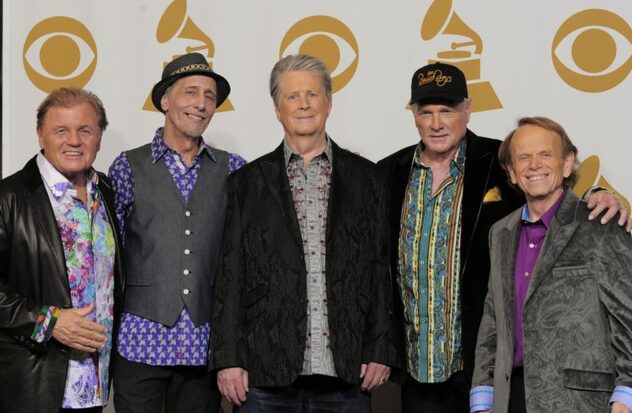The Wilson brothers, Brian, Carl and Dennis, along with their cousin Mike Love and friend Al Jardine, created a harmonic revolution to group vocals with their Southern sound. California who lit up the 1960s with songs like I Get Around, Good Vibrations y God Only Knows.
In the documentary about the group, director Frank Marshall took stories from the band’s six decades of anguish and harmony, and tried to make them broader and brighter, mixing as many voices as possible.
“It was a mix of everything,” Marshall told The Associated Press in a joint interview with Love and Jardine at a Hollywood recording studio. “It’s the mix not only of family history, but the mix of harmonies. If you took away one element, you wouldn’t have the Beach Boys.”
Love, 83, said Marshall’s project was a monumental effort for everyone involved and that they “have never done so much promotion in our entire lives.”
“This guy here, Frank, is able to take all that ridiculous amount of information and turn it into a coherent, wonderful documentary that really takes a look at not only the individuals, but also the collective impact,” he said.
Audiovisual details
The film includes extensive interviews with vocalist Love and 81-year-old singer-guitarist Jardine. And it draws on many archival interviews to give the perspectives of singer and guitarist Carl Wilson, who died of cancer in 1998 at age 51, and singer and drummer Dennis Wilson, who drowned in a Los Angeles-area harbor in 1984. at 30 years old, and his older brother Brian, the mind behind the band’s sound.
Brian Wilson, 81, makes contemporary appearances in Marshall’s film, including an emotional scene toward the end, the details of which are best left reserved for the public. But mental deterioration, which recently led loved ones to establish legal guardianship for him, meant his contributions were limited.
Often, media admiration for the group’s music focuses entirely on the elder Wilson, for what many consider his unmatched musical imagination and innovation. Marshall’s documentary does nothing to downplay his genius, but emphasizes that he was not alone.
It is rarely acknowledged, for example, that Love wrote the lyrics to dozens of songs, including I Get Around, California Girls, Help Me Rhonda and the sweetly poetic Good Vibrations, in his car on the way to the session to record them.
The Wilsons’ father and the band’s first manager, Murry Wilson, in one of the many moments of mismanagement shown in the documentary, sold the Beach Boys song catalog for $700,000 in 1969 without consulting the group. , and left Love’s name as a collaborator.
“It’s hard,” Love told the AP, “when your uncle sells your songs without giving you any credit. And it really hit Brian hard.” But, Love adds, “the good thing is that I contributed. My cousin and I wrote some great songs together.”
The surreptitious sale by Murry Wilson led to the rights to the song becoming a tangle that for years prevented Marshall, who made similar documentaries about the Bee Gees in 2022 and Carole King and James Taylor in 2020, from making the film. the Beach Boys that I had dreamed of for a long time. But the recent purchase of the rights by his friend Irving Azoff gave him the green light.
Marshall’s film also includes the voices of David Marks, who was briefly in the group in its early days; Bruce Johnston, who became Beach Boy in 1965; and famous fans across generations, including Don Was, Lindsey Buckingham and Janelle Monae.
Obstacles and successes
The Beach Boys does not shy away from the less sunny moments of its history, including Dennis Wilson’s flirtations with the Charles Manson family (before their notoriety as a murderous cult) and his dark and devastating drowning.
It also examines the mental health problems that left Brian Wilson unable to make music for long periods, and the bitter band-related disputes that escalated into wider family feuds.
Love is reduced to tears in the film when she talks about her estrangement from her cousin Brian and her desire to tell him she loves him.
The happiest moments are also abundant, especially from the first years. Jardine gets emotional in the film when he says that they auditioned a cappella for his mother, singing her a Four Freshmen melody and the Beach Boys’ first original song, surfing, so they could buy instruments and become a real band.
“She worked at a Macy’s and made about $300 a month,” Jardine told the AP. “He gave us the 300 dollars.”
That would make possible the emergence of The Beach Boys, a name, Jardine said, that he never liked.
Love said she tries to let go of the bitterness and focus on those moments.
“We know the impact of The Beach Boys’ music. It has been felt around the world,” he said. “We have much more to be grateful for than to regret.”
FUENTE: AP



